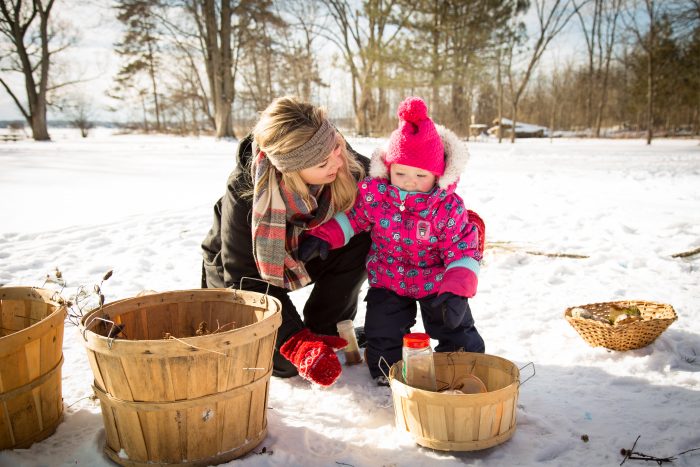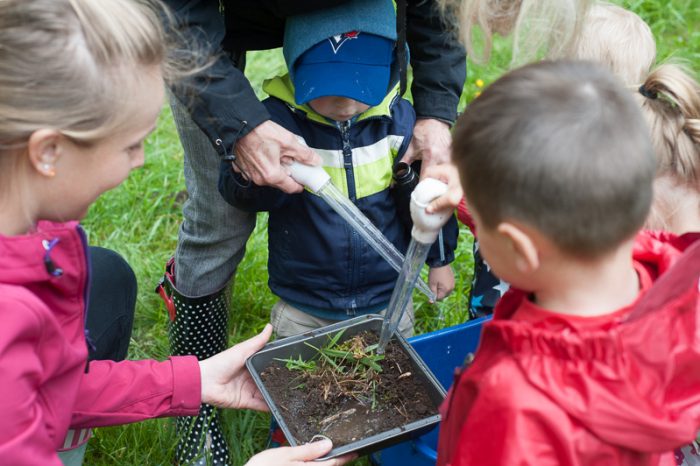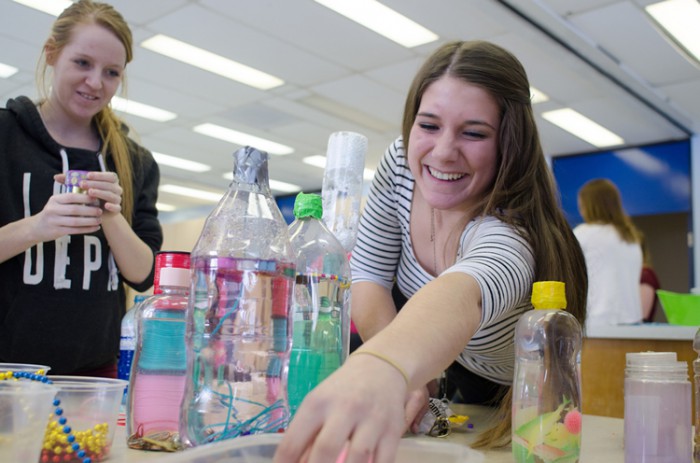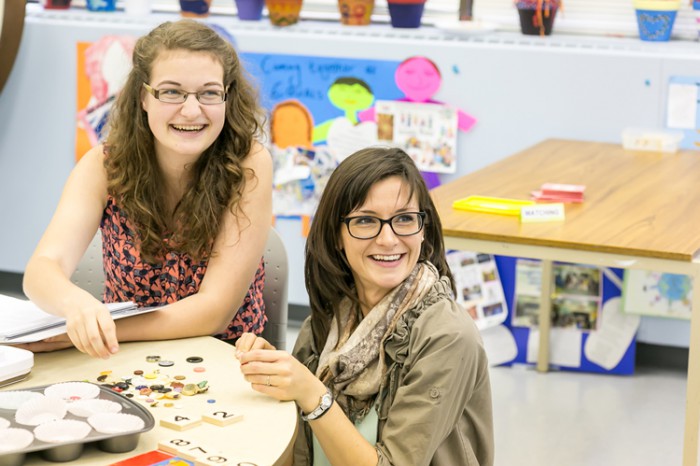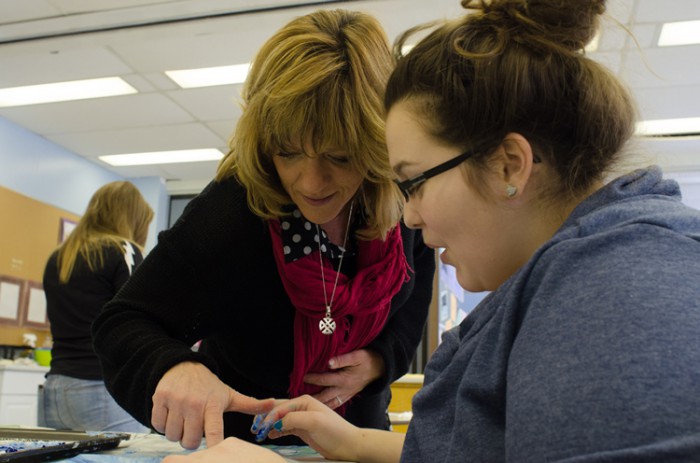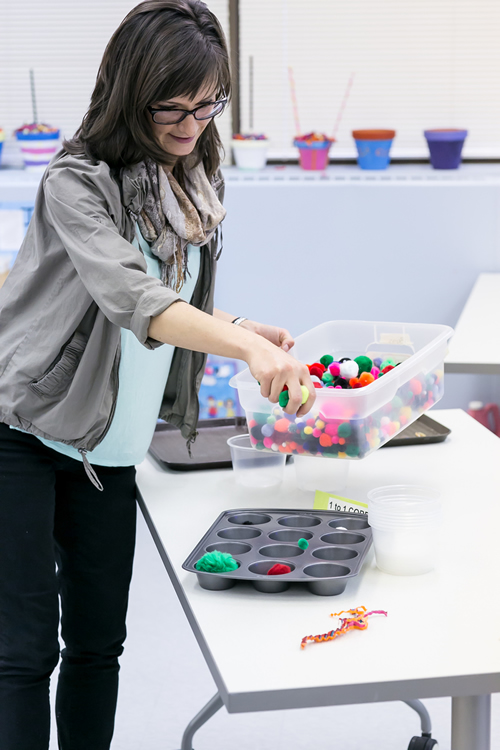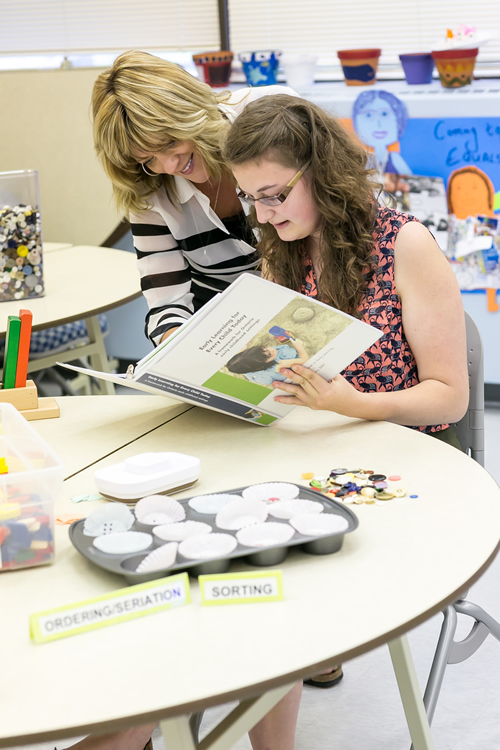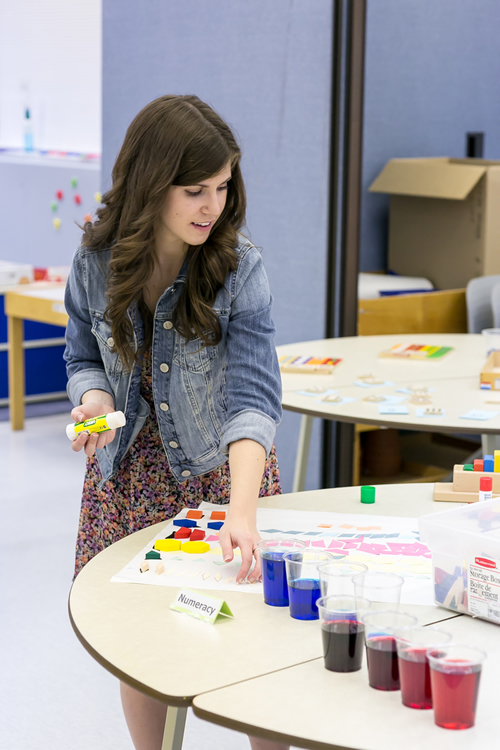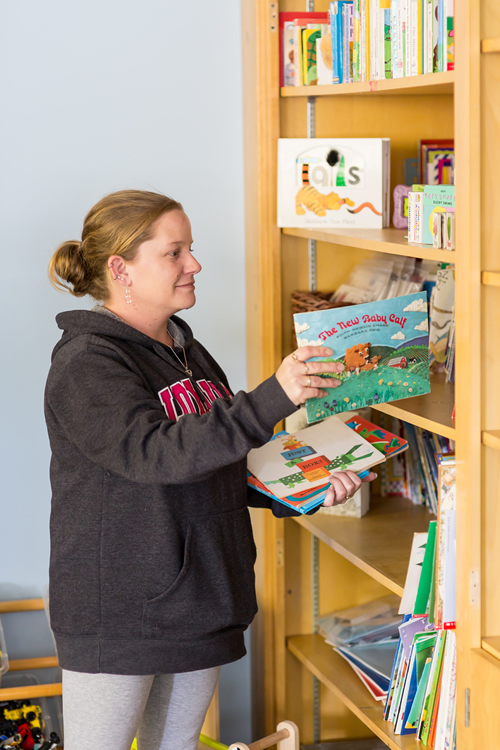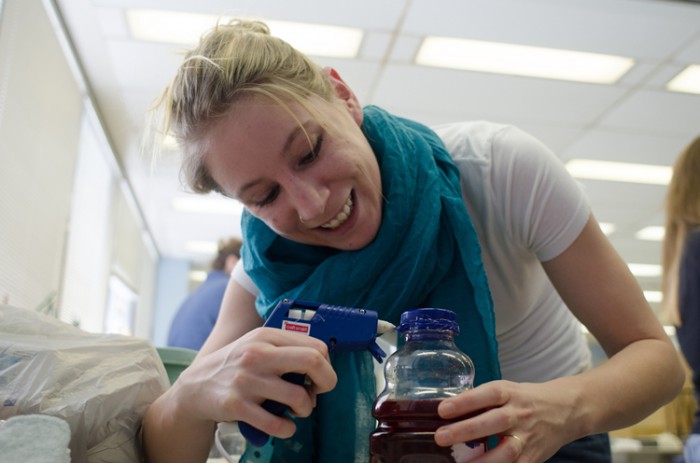Early Childhood Education
Available as a two-year program, distance or apprenticeship studies
- Credential
Two-year Ontario College Diploma
- Start Date
September and May entry
- Location
Belleville campus
Port Hope campus
Find your career
Graduates work as registered early childhood educators in various settings:
- Private and public full-day kindergarten programs
- Before- and after-school programs
- Child care centres
- EarlyON child and family centres
- Nursery schools
- Private home child care
- Children's services, including support with special needs, mental health services and early intervention programs
- Live-in and live-out nannies, both in Canada and abroad
- Resource centres
- Cruise ships and resorts
- Children's museums, art galleries and science centres
Our grads get great jobs
- Early Childhood Educator, Algonquin & Lakeshore Catholic District School Board
- Educational Assistant, Hastings & Prince Edward District School Board
- Toddler Room & School Aged Children RECE, First Adventure Child Development Centre
- Toddler Toom RECE, YMCA Muskoka Family Focus
- RECE, Military Family Resource Centre
Is it for you?
You love kids. Of course you do. But is this the career for you? It may be a good fit if you have:
- Patience and compassion
- A creative approach to problem solving
- The ability to approach a challenge from different perspectives
- A sense of fun
What employers say
“Early Childhood Education students are getting an extremely formative background here at Loyalist. They are led by people that have a real vision for play-based learning and they’re given lots of opportunities to apply theory into practice.”
Lynne Crawford Beare
Curriculum Coordinator, Hastings and Prince Edward District School Board
Experiential learning
Loyalist’s ECE program consistently ranks high in student and graduate satisfaction, combining theory with practice:
- Design and implement curriculum to meet the diverse learning needs of children at different stages.
- Learning emphasizes inclusive practices, partnerships with families, multiple intelligences and evidence-based practices.
- Get a range of experiences in community early learning programs for infants , toddlers, preschoolers and school-aged children.
Outstanding faculty make the difference
- Experienced faculty share their knowledge of best practices and today’s job realities.
- Teachers work with students in the selection of placement experiences to support their individual interests and career goals.
Courses
Please note: The program of study and courses below reflect the full-time, on-campus Early Childhood Education program for Fall 2023. For an overview of courses for the Distance program (ECED) and Child Development Practitioner Apprenticeship Certificate (ECEM), please visit loyalistfocus.com.
- Semester One
- COMM1048 College Writing Skills
- This course focuses on writing and research skills required for successful completion of college-level studies. The course will promote development and improvement of research and writing skills that can be applied to students’ chosen programs of study.
- CADW1005 Creative Play
- This course will provide an introduction to play as a means to early learning that capitalizes on children's natural curiosity and exuberance. Students explore the role of play in early learning and development and will be introduced to a variety of play-based learning opportunities.
- CADW1007 Introduction to Child Development
- This introductory course provides an overview of key principles of child development. A variety of theories that explain how children develop and learn as well as research methodologies used to further knowledge in this field will be examined. Foundations for supporting development and learning are introduced and emphasis is given to the understanding of the uniqueness and diversity of children’s developmental context. This introductory course will examine biological and environmental influences on growth and development with a focus on conception, prenatal development and childbirth.
- ECEP1006 Introduction to Early Childhood Education
- This foundational course introduces the field of early childhood education and care in Canada and the historical perspectives that have led to joining education and childcare to offer seamless experiences for children from birth to age six. The policies and legislation that shape the range of models, services, and settings are explored, along with evidence informed practices in regard to quality of service delivery. The opportunities and challenges for the early childhood workforce and for the individual's professional growth are established as themes that will be further investigated in later courses.
- ECEP1010 Observing Early Development
- This course introduces knowledge and skills in authentic observation that are necessary to becoming reflective and responsive early educators. The significance of the observation cycle and how this contributes to reflective practice and quality of early learning experiences is examined. A variety of observation strategies that enable the discovery and understanding of children’s learning, interests and potential is introduced. Observation of the early environment as the “third teacher” will also be explored. Students are encouraged to discern the appropriateness of observation strategies in varying contexts in order to identify strengths and challenges in children and the learning environment. Through this critical process, they will learn to ascertain how children and families may benefit from further support and resources.
- GNED1100 Becoming a Global Changemaker
- This Loyalist College graduate attributes course will help shape your perspectives, broaden your understanding of important issues affecting our societies today, and equip you with invaluable knowledge and skills that will inform your ability to influence your community in a meaningful and impactful way. By exploring topics such as cultural competency, Indigenous education, entrepreneurship, sustainability, health and wellness, and ecological literacy, you'll be equipped with a powerful toolkit that extends far beyond the classroom.
- Semester Two
- ECEP1013 Health, Safety & Nutrition
- This course provides students with the foundational knowledge for establishing a healthy and safe early years environment. Health promotion and occupational health issues within the early years field is examined with attention given to social-cultural context that is unique and diverse. Child development knowledge, observation, current legislation, and agency/school board polices are introduced to guide students in decision-making with regards to supporting physical, mental and emotional health of young children. Students will also examine the early educator’s role in collaborating with families and community to create, maintain, evaluate and promote safe and healthy early learning environments that support independence, reasonable risk-taking and healthy development and well-being.
- CADW1006 Infant Toddler Development
-
This course examines a variety of theories and principles of growth and development in infants and toddlers. Students will study typical and varying characteristics of physical, cognitive, language, social and emotional development and the interrelatedness of these domains. Observation and documentation of infants' and toddlers’ emerging competencies, curiosity and potential will frame the study of their development and learning. Students will consider significance of the uniqueness and diversity in children, family, and communities in early development. This course encourages students to become reflective and responsive early educators by considering multiple perspectives of how infants and toddlers develop and learn.
Prerequisite: CADW 1007, ECEP 1010 - ECEP1008 Infant Toddler Learning Environment
-
This course examines the role of the early childhood educator in creating responsive environments to promote infant and toddler development. Students identify best practices and determine developmentally appropriate learning experiences for infants and toddlers.
Prerequisite: ECEP 1006, CADW 1005, ECEP 1010 - WKPL1032 Practicum 1
-
In this course, the student will apply what they have learned in the ECE program in an early years' setting. Students will learn and practice the roles and responsibilities of the early childhood educator through relationships with children, educators, and families. Through observation, reflection and practice, students develop skills in building relationships with children, families and the program team, creating and implementing curriculum, creating rich, inclusive, and safe environments, and demonstrating professionalism.
Prerequisite: CADW 1005, CADW 1007, COMM 1048, ECEP 1006, ECEP 1010
Co-requisite: PROF 1010 - PROF1010 Practicum Seminar 1
-
This course will provide support for students to apply theory to practice in Practicum 1. This course is designed to provide students with the opportunity to deepen their understanding of the role and responsibilities of the Early Childhood Educator by collaborating with faculty and peers to build knowledge and skills required for Practicum 1.
Prerequisite: CADW 1005, CADW 1007, COMM 1048, ECEP 1006, ECEP 1010
Co-requisite: WKPL 1032 - ECEP1012 Responsive Relationships 1
-
This foundation course introduces the role of responsive relationships as fundamental to early childhood practice. With a focus on infants and toddlers, the course explores how responsive and inclusive relationships nurture children’s holistic development and sense of belonging and well-being. This course explores the role of the educator in creating responsive and inclusive learning environments where children gain a positive self-concept and learn to live well with others. The self-reflection process is used to explore biases in thinking about and responding to infants and toddlers.
Prerequisite: ECEP 1006, ECEP 1010, CADW 1007 - GNED General Education Elective
- General Education Courses
- Semester Three
- ECEP2008 Child, Family & Community
- In this course, students examine the early childhood educator's role in developing effective partnerships with children, families, and the community. Students examine their own values and beliefs and learn how they may impact these partnerships. Students examine the importance of respecting diversity, cultural competence and social justice in the early years setting. Students learn the signs and symptoms of child maltreatment (physical, emotional, and sexual abuse) and neglect. Students will learn about prevention and support strategies, legal responsibilities, and the reporting process.
- WKPL2049 Practicum 2
-
In this course, the student will apply what they are learning in the ECE program to their work placement. Students will learn and practice the roles and responsibilities of the early childhood educator through relationships with children, educators, and families in an early years setting. Through observation, reflection and practice, students develop skills in building relationships with children, families and the program team, creating and implementing curriculum, creating rich, inclusive, and safe environments, and demonstrating professionalism.
(Requires successful completion of semesters 1 & 2)
Prerequisite: CADW 1006, ECEP 1008, ECEP 1012, ECEP 1013, PROF 1010, WKPL 1032
Co-requisite: PROF 2017 - PROF2017 Practicum Seminar 2
-
This course will provide support for students to apply theory to practice in the Practicum 2. This course is designed to provide students with the opportunity to deepen their understanding of the role and responsibilities of the Early Childhood Educator by collaborating with faculty and peers to build knowledge and skills required for Practicum 2.
Prerequisite: CADW 1006, ECEP 1008, ECEP 1012, ECEP 1013, PROF 1010, WKPL 1032
Co-requisite: WKPL 2049 - CADW2001 Preschool Development
-
This course builds on infant-toddler development and examines theories and principles of growth and development in preschool-aged children. Typical and varying characteristics of physical, cognitive, language, social and emotional development and the interrelatedness of these domains are examined. Observation and documentation of preschoolers’ emerging competencies, curiosity and potential will frame the study of their development and learning. Students will consider significance of the uniqueness and diversity in children, family and communities in early development. This course encourages students to become reflective and responsive early educators by considering multiple perspectives of how preschoolers develop and learn.
Prerequisite: COMM 1048, CADW 1006, ECEP 1008, ECEP 1013 - ECEP2002 Preschool Learning Environment
-
This course provides students with strategies to establish a responsive environment in a variety of early learning and care settings and apply curriculum approaches that promote holistic development in the preschool years. The role of a responsive ECE is explored in relation to evidence-informed practices that support co-creation, facilitation, and reflection of inquiry and play-based programs.
Prerequisite: CADW 1006, ECEP 1008, ECEP 1012, ECEP 1013, PROF 1010, WKPL 1032 - ECEP2009 Responsive Relationships 2
-
Respectful, inclusive, responsive relationships between educators, children and families is fundamental to early childhood education practice and builds a foundation for optimal holistic development and sense of belonging and well-being. With a focus on supporting social and emotional development, this course explores the role of the educator in creating responsive and inclusive learning environments where children gain a positive self-concept as an individual and as a member of a community.
Prerequisite: COMM 1048, CADW 1006, ECEP 1012
- Semester Four
- CADW2002 Children with Exceptionalities
-
The course explores children’s exceptionalities from a developmental framework and examines inclusive programming based on current research and developmentally appropriate practice. Policies that reinforce or deter inclusive practices will be examined.
Prerequisite: CADW 2001, ECEP 2002, ECEP 2008, ECEP 2009 - ECEP2007 Evidence-Informed Practices
-
This course will examine how research influences the field of early learning and care and the establishment of evidence-based practices. The focus will be on acquiring proficiency in the use of specific evidence-based curriculum programs and articulating the rationale for their use in the context of the ELECT, FDEL-K and role of the ECE.
Prerequisite: CADW 2001, ECEP 2002, ECEP 2008, ECEP 2009, PROF 2017 - ECEP2010 Policy, Advocacy & Professionalism
-
The course will examine the interconnection of legislative and regulatory policy, funding and administrative practices on the structure and quality of early years programs in Ontario and the role of the educator and administrator. Students will explore the trends and issues in the field of early childhood education and apply leadership and advocacy strategies to support stakeholders in relationship to policies and current research in professional development and practice.
Prerequisite: CADW 2001, ECEP 2002, ECEP 2008, ECEP 2009 - WKPL2072 Practicum 3
-
In this course, the student will apply what they are learning in the ECE program to their work placement.. Students will learn and practice the roles and responsibilities of the early childhood educator through relationships with children, educators, and families in a kindergarten or school-aged environment. Through observation, reflection and practice, students develop skills in building relationships with children, families and the program team, creating and implementing curriculum, creating rich, inclusive, and safe environments, and demonstrating professionalism.
Prerequisite: WKPL 2049 - CADW2003 School-Age Development
-
This course builds on preschool development and examines a variety of theories and principles of growth and development in school-age children. Typical and varying characteristics of physical, cognitive, language, social and emotional development and the interrelatedness of these domains are examined. Observation and documentation of school-age children’s emerging competencies, curiosity and potential will frame the study of their development and learning. Students will consider the significance of the uniqueness and diversity in children, family and communities in early development. This course encourages students to become reflective and responsive early educators by considering multiple perspectives of how school-age children develop and learn.
Prerequisite: CADW 2001, ECEP 2002, ECEP 2008, ECEP 2009 - ECEP2005 School-Age Learning Environment
-
This course explores the issues relating to school aged children's social, emotional, cognitive, and physical development and their impact on the types of services required for children and their families. The ECE role in providing a responsive environment to meet the ranges of ages and abilities is described, along with considerations for engaging children in meaningful curricula projects and recreational pursuits. Quality indicators and evidence based practices are researched and incorporated into curriculum planning.
Prerequisite: CADW 2001, ECEP 2002, ECEP 2008, ECEP 2009, PROF 2017 - GNED General Education Elective
- General Education Courses
*Courses subject to change.
Turn your diploma into a degree
Many universities across Canada and abroad will provide credit recognition for your diploma studies at Loyalist College. The following is a list of agreements that are currently in place. There are many more options, and new agreements are added annually. Contact your university of choice to make individual arrangements. Click here for more information about university transfer agreements.
- Algoma University – B.A.; B.B.A.; B.Sc.; Bach. Computer Science
- Athabasca University – Bachelor of Professional Arts in Human Services
- Brock University – B.A. (Honours) Early Childhood Education
- Carleton University – various*
- Davenport University – B.A. General Business
- George Brown College – Bachelor of Applied Arts in Early Childhood Leadership
- Griffith University – Bachelor of Arts
- Institutes of Technology Ireland
- Institute of Technology Tralee – Bachelor of Arts in Early Childhood Care and Education (Year 3)
- Lakehead University – Bachelor of Education (Concurrent Education) Primary/Junior Specialization
- Laurentian University – various*
- Laurier Brantford – any honours program
- Nipissing University – Bachelor of Arts
- Ryerson University – Bachelor of Arts in Early Childhood Studies
- Seneca College – Bach. Child Development; Bach. Interdisciplinary Studies
- University of Guelph – Bachelor of Applied Science (Honours) in Early Childhood
- Ontario Tech University – B.A. Adult Education and Digital Technology
- University of Waterloo – various*
- University of Windsor – B.A. (General or Honours); B.A. (Honours) Disability Studies; Bachelor of Social Work
- Wilfrid Laurier University – various*
- York University – various*
- Atlantic Technological University - Year 3 Bachelor of Education (Hons) in Early Education and Care
What universities say
“Some of our best students have come from Loyalist so we know the academic training you guys are giving them is excellent!”
S. Parlow, Ph.D., Program Coordinator
Institute for Interdisciplinary Studies (Child Studies) and Associate Professor of Psychology, Carleton University
Study Abroad
Explore opportunities to continue your studies in Ireland:
How much will it cost?
Belleville Campus
Approximate costs (2024 – 25)
- Domestic Tuition: $2,722.08
- Full-Time Ancillary Fees:* $1,367
- Total: $4,089.08
Port Hope Campus
Approximate costs (2024 – 25)
- Domestic Tuition: $2,722.08
- Full-Time Ancillary Fees:* $609
- Total: $3,331.08
Additional costs, such as supplies, travel and parking, may be incurred during workplace visits, etc.
*Fees related to programs that are less than or greater than two semesters will be adjusted accordingly. Fees are subject to change. Please visit the Tuition and Fees web page for a list of the many services, activities and items included within the ancillary fees, and the related policies.
Bursaries and financial assistance
Loyalist College has a number of scholarships, bursaries and academic awards available to students. Our Financial Aid Office can help you explore your options, or assist you with a student loan.
Hastings County ECE Scholarship
Loyalist College will distribute up to $3,000 in financial support for 50 qualifying students pursuing childcare careers in Hastings County. Eligible class groups include:
- Students entering first semester in September 2023
- Students entering first semester in September 2024
Learn more about the Hastings County ECE Scholarship here. If you have questions, please reach out to awards@loyalistcollege.com.
Admission requirements
Required academic preparation
- OSSD/OSSGD or equivalent with courses at the general, advanced, (C), (U) or (M) level, AND
- Grade 12 English (C) level or equivalent
OR
Additional requirements
- An up-to-date immunization and Tuberculosis (two-step TB) test are required as part of the registration process.
- Standard First Aid and Level “C” CPR certification.
- Clear, current Criminal Record Check and Vulnerable Sector Check.
- If you have been convicted of an offence under the Criminal Code for which you have not been pardoned, you may be ineligible for field placement; please contact the coordinator to discuss your options.
Distance program (ECED)
- Loyalist offers the entire Early Childhood Education program by distance learning.
- You can begin studies in September, January and May.
- For information about registration and course fees, please see loyalistfocus.com.
Child Development Practitioner Apprenticeship Certificate (ECEM)
- You can turn your CDP certificate into an ECE diploma — ask us how: ceece@loyalistcollege.com.
- You can complete your studies while you continue to work as a registered apprentice with the Ministry of Training, Colleges and Universities. You and your employer must enter into a contract representing your employer’s willingness to support you through this certificate.
- In addition to the admission requirements listed above, you must be 16 years of age or over to apply
- There is no on-campus requirement to earn an apprenticeship certificate. For more information about registration and course fees, please see loyalistfocus.com.
- Information about qualification requirements leading to certification are available from the Ministry of Training, Colleges and Universities, 416-326-5800, or a regional office: Belleville 613-968-5558; Kingston 613-548-1151; Pickering 905-837-7721; or Peterborough 705-745-1918.
Prior learning assessment and recognition
Applicants with work experiences or other types of non-credentialed learning may be eligible for credits at Loyalist. Graded credits (as opposed to exemptions) are granted. Click here for more information about our assessment and credit challenge process.
International students
Click here for information about how to apply, international student fees and more.
Campus News
LOYALIST COLLEGE RECEIVES $150K INVESTMENT FROM COUNTY OF HASTINGS TO ...

Belleville, ON, April 5, 2023 – Loyalist College received a $150,000 investment from the County of Hastings to support current and future students enrolled in the College’s Early Childhood Educ... Read More
LOYALIST COLLEGE PARTNERS WITH YMCA NORTHUMBERLAND TO OFFER FLEXIBLE P...
 Belleville, Ontario, April 17, 2019 – Loyalist College and YMCA Northumberland have partnered to provide YMCA employees with access to the College’s online, part-time Early Childhood Education ... Read More
Belleville, Ontario, April 17, 2019 – Loyalist College and YMCA Northumberland have partnered to provide YMCA employees with access to the College’s online, part-time Early Childhood Education ... Read More
LOYALIST COLLEGE ADDS SEVERAL DEGREE PROGRAMS THROUGH THE INSTITUTE OF...
 Belleville, Ontario, May 31, 2018 – Graduates of six Loyalist College two- and three-year diploma programs now have the opportunity to earn a degree at the Institute of Technology Tralee, Ireland, ... Read More
Belleville, Ontario, May 31, 2018 – Graduates of six Loyalist College two- and three-year diploma programs now have the opportunity to earn a degree at the Institute of Technology Tralee, Ireland, ... Read More
College of Early Childhood Educators Representative at Loyalist

On March 20th, Laura Sheehan, Director of Registration and Member Services at the College of Early Childhood Educators, spoke with Loyalist Early Childhood Education (ECE) students. It was ... Read More
ECE Program CELEBRATES PLAY with Community Members
 The Loyalist College Early Childhood Education Program partnered with education-focused institutions in the community, including the Elementary Teachers’ Federation of Ontario (ETFO) in Hastings-Pri... Read More
The Loyalist College Early Childhood Education Program partnered with education-focused institutions in the community, including the Elementary Teachers’ Federation of Ontario (ETFO) in Hastings-Pri... Read More
In the News
Women in Business Profiles: Colleen Collins & Miranda Popovic
 The Lindsay Advocate
The Lindsay Advocate
ON CAMPUS: Helping young minds develop
 Belleville Intelligencer
Belleville Intelligencer
ON CAMPUS: Hands-on learning key
 Belleville Intelligencer
Belleville Intelligencer
ON CAMPUS: Learning that lasts a lifetime
 Belleville Intelligencer
Belleville Intelligencer





